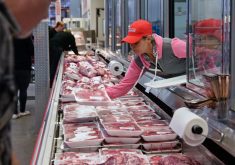The political zoo that we call Parliament offers many things of value — sometimes grand and important debates, clever language by professional wordsmiths, entertainment and the core of Canadian parliamentary legitimacy.
One thing it does not offer in abundance is perspective.
Consider the latest feverish “scandal” over allegations that Conservatives paid, directed or inspired election campaign operatives to call hundreds, maybe thousands, of voters across Canada during the 2011 campaign to misdirect them to phantom polling stations or to purport to be Liberal or NDP campaigners who call at inappropriate times and often be rude, presumably to discourage voters from supporting those parties.
Read Also

Canola oil transloading facility opens
DP World just opened its new canola oil transload facility at the Port of Vancouver. It can ship one million tonnes of the commodity per year.
The Conservatives deny any orchestrated national campaign, conceding only that some local rogues may have crossed a line.
Elections Canada is investigating allegations in several ridings and the RCMP may be getting involved.
Every day, opposition MPs make new allegations, which in their mind makes the scandal bigger.
Media report each new allegation as fact and the frenzy grows.
It is a familiar pattern.
In the 1990s, when the Liberals were in power, Reform MPs (now Conservatives) spent days pounding then-human resources minister Jane Stewart over what they (and media) called the “billion-dollar boondoggle.”
The implication was that $1 billion had been misspent, misappropriated or stolen in her department.
Nothing came of it, no money was ever found to have been misappropriated, Reformers moved on when they had extracted as much political blood as they thought was possible and soon another political prey was in their sights.
So we come to the “robocall scandal” of orchestrated mischievous calls to voters.
Whoever did it was dumb since many of the reported calls came in ridings where a significant majority for the incumbent was almost assured. It would be a waste of a dirty trick.
Of course, if miscreants are found who impersonated Elections Canada officials, as is alleged, that is against the law. Charge them.
If Conservative operatives are found to have been calling hundreds of voters in ridings where the outcome was not much in doubt, they should be fired for stupidity, risking almost certain exposure for little real return.
But the narrative playing out in Parliament is much bigger than a few incompetent and over-zealous local Tory operatives.
It is “The Scandal of The Century.”
Listen to Winnipeg NDP MP Pat Martin, one of the smartest, hardest-working, quick-witted and partisan MPs on the Hill:
“It is more in sadness than anger that Canadians watch what could be the most comprehensive election fraud in Canadian history,” he said.
The most comprehensive election fraud in Canadian history? Really?
For my money, there are far better candidates:
• in 1988, Canadian big business, American subsidiaries and Progressive Conservative corporate buddies spent as much as $10 million to buy the free-trade election for the PCs and Brian Mulroney in the last three weeks of the campaign after the Liberals and leader John Turner soared to a 12 percent lead in the polls on anti-free trade arguments.
The money went into expensive radio, television and newspaper advertisements that attacked Turner’s character. The “bomb the bridge” campaign to challenge Turner’s credibility produced a Tory victory with 43 percent of the vote despite the opposition of a solid majority.
While legal under the election financing rules of the day, it amounted to a lavish corporate purchase of a pro-business result that most Canadians rejected.
• In 1974, Liberal Pierre Trudeau won a majority by rejecting Tory wage-and-price control proposals. Within a year, he imposed them.
Sounds like victory based on deception to me.
• In 1917, Conservative prime minister Robert Borden manipulated voting rules to offend almost every conceivable standard of fair play to win re-election in the First World War conscription election. He postponed the election beyond its constitutionally required five years until conditions were more favourable, gave the vote for the first time to women but only if they had male relatives in the war and therefore were likely to vote Tory, disenfranchised Canadian citizens from “enemy countries” and distributed soldier votes to ridings where the Conservatives needed them to win.
Now that is my definition of “the most comprehensive election fraud in Canadian history.”
And of course, there was John A. Macdonald’s famous telegram to businessman Hugh Allan during the 1872 election demanding $10,000. Allan was a capitalist marauder deeply involved in making millions from Macdonald’s dream of building a national railway.
That was a scandal. It brought down a government.
Hundreds or thousands of calls to trick Canadian voters to change their votes or not to vote is disgusting, stupid and perhaps illegal.
It is not the most comprehensive election fraud in Canadian history.
Barring significant future revelations, not by a long shot.
















